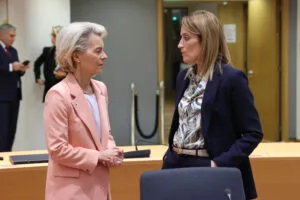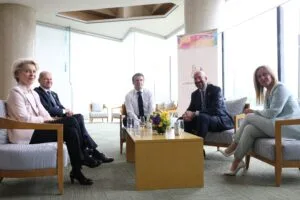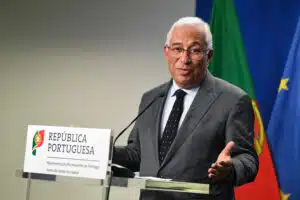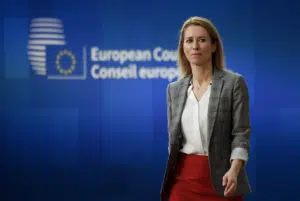Brussels – It is the top jobs day, which could become decisive for the next five years of legislature in the European Union. When everything is ready in Brussels for the informal summit of the heads of state and government of the 27 member countries, high-level EU appointments to the Union’s main institutions are taking on increasingly defined contours with the passing of each hour, with the scenario of a rapid division of the highest offices just a few days since the European elections never more concrete.

Beginning late this afternoon (June 17), EU leaders will meet at the Europa Palace to take initial stock of the situation after the June 6-9 elections – together with the President of the Commission, Ursula von der Leyen, and of the Parliament, Roberta Metsola – before the actual informal dinner at which the EU nomination package will be on the table, which for days has consisted of a shortlist of four names for four posts: those of von der Leyen and Metsola for confirmation in their respective EU institutions, that of Portugal’s former Prime Minister, António Costa, for the European Council, and that of Estonia’s premier, Kaja Kallas, as EU High Representative for Foreign Affairs and Security Policy. After last week’s controversy over the attempt by the acting European Council president, Charles Michel, to exclude the EU Commission’s number one from the informal summit altogether – as she is also the main candidate to succeed herself – von der Leyen (with Metsola) will attend the first session of work, then leave the table when the 27 leaders are to talk about her position as well.
If confirmed at today’s informal meeting, the package of EU nominations – two to the European People’s Party (EPP), one to the Party of European Socialism (PES), and one to the Liberals of Renew Europe – will pass to the European Council scheduled for Thursday and Friday of next week (June 27-28) for official appointments. Only the election of the Presidency of the European Parliament is the exclusive responsibility of the European Parliament, while that of the European Commission will also have to go through the confirmation of the plenary session, where there is already a clear majority between Popular, Social Democrats, and Liberals (and with the possibility of entry of the Greens). Meanwhile, the first indications have already arrived that a general agreement among the Twenty-Seven could materialize as early as today’s summit, paving the way for one of the fastest-ever EU nomination processes.

“I think we can move forward effectively. That’s what I hope. I hope we can come to an agreement quickly,” said the French president, Emmanuel Macron, after an initial confrontation at last week’s G7 Summit in Puglia, stressing, however, that “it’s a discussion among the Twenty-Seven.” The Elysee tenant, who on the eve of the European elections was the biggest unknown for von der Leyen’s confirmation, now faces campaigning for the snap elections in France on June 30 and does not seem to have any interest in a delay of EU nominations. In this regard, Italian Prime Minister Giorgia Meloni raised – also on the sidelines of the G7 – some doubts about the timing, calling “common sense” the possibility of waiting for the outcome of the French vote before the decision on the heads of the EU institutions. In any case, Macron will always be the interlocutor at the European Council table and for Italy, the postponement “is not a prejudicial issue,” the Italian leader reassured. Opening decisively, however, is the German Chancellor, Olaf Scholz, who told a group of journalists at the end of the proceedings in Fasano that “there are all the signs that von der Leyen will be able to serve a second term,” particularly given the fact that decisions in Brussels on EU appointments must be made “very quickly” and “in one go” to “enable the European Union to act” in an uncertain and threatening global context.
The package of EU charges on the table of the Twenty-Seven
The European People’s Party has already confirmed that, after the convincing electoral test of the national parties affiliated with the EPP, they expect to obtain both the Presidency of the Commission and that of the first two-and-a-half-year “round” of Parliament in perfect continuity with the end of the ninth legislature, also in terms of the names: Germany’s von der Leyen and Malta’s Metsola, respectively. As for the former, there do not appear to be any credible alternatives at present for the leadership of the Union’s executive, although von der Leyen must guard against the political uncertainty in several capitals after the European elections. As for the Presidency of the European Parliament, the leading name is still that of Metsola, who has been head of the EU institution since January 2022, and the likely election is expected to come at the inaugural plenary session of the tenth legislature between July 16 and 19. As for the passing of the baton between Popular and Social Democrats to the presidency of the EU Parliament over the next five-year legislature, several sources in the two groups warn that it is still a premature issue and will depend on the distribution of posts in the other EU institutions.

European Socialists are betting all their cards on the next presidency of the European Council, having reconfirmed themselves as the second force in the European Parliament and limiting the risk of hemorrhaging votes. The European Socialists remain the unavoidable partner for the Populars in the centrist majority in the EU Parliament, which is why, given the parallel collapse of the Liberals, they are now aiming for more than just the EU high representative (as they have in the last two terms). The clear favorite is Portugal’s former Premier Costa, who has reportedly already cashed in on the support of the center-right government headed by Luís Montenegro, while in other capitals, the investigation over alleged corruption that forced his resignation in November 2023 is not considered a problem, although it does not concern him personally.

Last but not least, there is the final post at stake after the European elections, which, in the logic of partitioning the EU institutions’ top leadership between parties, should be claimed by the Liberals. In pole position for the post of EU High Representative for Foreign Affairs and Security Policy is the current Estonian PM Kallas, who, since February 24, 2022, has carved out the role of irreproachable leader at the side of Ukraine after it was invaded by Russia, among the most determined at the table of the 27 EU leaders. This card could earn the Estonian Premier a promotion to the head of the Union’s foreign policy as a statement of support for Kyiv that, after more than two years, is not likely to wane from Brussels. Another suspect from a geographic standpoint of outright support for Ukraine is the current Lithuanian Foreign Minister, Gabrielius Landsbergis, but – unlike Kallas – he would lack party credentials (he is a Popular) and less political clout.
English version by the Translation Service of Withub









